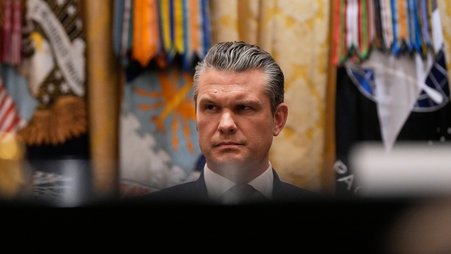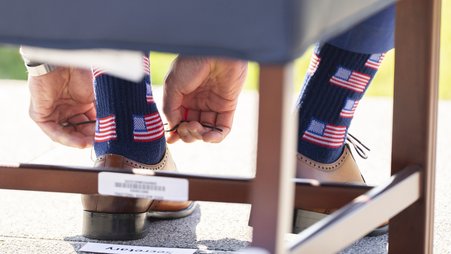
Florida Rep. Alex Andrade has introduced new legislation to undermine longstanding protections for press freedom. "Florida’s Historic Capitol and Florida State Capitol 2" by Michael Rivera is licensed under CC BY-SA 3.0.
Last month, a strange scene played out on X, formerly known as Twitter. Florida governor and Republican presidential candidate Ron DeSantis scolded primary rival Nikki Haley for proposing a crackdown on anonymous speech. The First Amendment has protected anonymous and pseudonymous speakers for centuries, he rightly noted, and they’ve in turn made rich contributions to American discourse. Who would dare silence them?
How about DeSantis? Earlier this year, it was DeSantis who prompted Florida state representative Alex Andrade to introduce legislation to pave the way for the powerful to bankrupt their critics with flimsy defamation lawsuits. Included in that awful bill was a provision that — you guessed it — punished anonymous speech. The bill failed after intense backlash from press freedom advocates, legal scholars, and media outlets, especially conservative ones.
DeSantis may have changed his tune (at least when it’s politically convenient) but Andrade sure hasn’t. He’s introduced a new, scaled-back edition of the bill. The removal of some of the first bill’s other anti-press provisions means that this time anonymous speech is front and center.
Bill assumes anonymous sourcing, by nature, is reckless
The new bill creates a presumption that publishers of erroneous news reports citing unnamed sources must have acted with “actual malice.” That means they either knowingly lied or recklessly disregarded whether their reporting was false. Andrade argues that reporters who get the facts right need not worry, but the point of the actual malice standard is to distinguish intentional fallacies from errors that are inevitable when covering fast-developing, contentious stories, especially when officials are intent on evading transparency.
That standard is a product of the seminal 1964 Supreme Court case, New York Times v. Sullivan. That case was meant to stop public figures from retaliating against detractors with “gotcha” defamation suits over minor alleged errors. Usually, the damages these kinds of errors cause to news subjects are minimal, but the costs to media outlets (let alone individuals) of defending them in court can be crippling. Until the recent rise in SLAPPs (short for strategic lawsuits against public participation), Sullivan was relatively successful in halting that kind of censorious harassment, while allowing meritorious claims to proceed.
The new Florida bill essentially assumes that the Sullivan case doesn’t limit lawsuits based on anonymously sourced stories because using anonymous sources is, by nature, reckless. That would’ve been news to Bob Woodward and Carl Bernstein and countless other award-winning journalists whose anonymous sources have helped them expose all varieties of malfeasance.
Sources have good reason to not want their names in the paper. They might fear long prison sentences under the Espionage Act or federal or state computer crime laws. Their government employers might unconstitutionally restrict them from talking to the press. Corporate whistleblowers often risk their careers if they’re outed. Some sources might even fear for their safety, or that of their families.
That’s exactly why Florida is one of 49 states that recognize a reporter’s privilege protecting journalists from being compelled by courts to burn their sources. But if Andrade gets his way, journalists who protect their sources will lose a key legal defense. That might lead to more journalists exposing sources to retaliation in order to defend themselves in court. More likely, it would lead to whistleblowers hesitating to come forward in the first place, and journalists hesitating to report their revelations when they do.
For Andrade, that’s a feature, not a bug. We know that because his prior bill directly targeted Florida’s reporter’s privilege, its anti-SLAPP law, and every other meaningful legal protection enjoyed by journalists in the Sunshine State and around the country. Andrade acknowledged in the preamble to the bill that it violated First Amendment precedents and that his intention was to set up a Supreme Court challenge to Sullivan and its progeny (a later version rewrote that preamble but Andrade had already shown his cards).
Plenty more wrong with Andrade bill
Sure, this version of the bill isn’t quite as bad, but it’s obviously just a foot in the door.
And there’s plenty else wrong with it besides its attack on anonymous sourcing. It seeks to resurrect an archaic, disfavored cause of action called “false light invasion of privacy” when reporters use artificial intelligence. False light, unlike defamation, allows recovery for objectively true statements that may leave a subjectively false impression. Florida courts previously recognized the First Amendment can’t tolerate that kind of ambiguity in speech cases.
It’s unclear why AI cases should be any different. Andrade probably thought AI is so unpopular that he could sneak in a false light revival without much pushback. But we know from his prior bill that he ultimately wants to bring back false light claims across the board, not just in AI cases.
The new bill also allows defamation and other claims based on broadcasts or internet publications to be filed anywhere in Florida, regardless of whether the location has anything to do with the lawsuit. This serves no purpose besides letting plaintiffs fish for sympathetic judges.
If another country passed legislation like Andrade’s, the judgments it enabled would likely be ineffective in the United States. Congress passed the federal SPEECH Act to combat international “libel tourism” by prohibiting courts here from enforcing foreign judgments that are contrary to established U.S. protections for First Amendment freedoms, like the Sullivan case.
Now Andrade wants to import libel tourism to Florida. Florida Republicans like to market the state as “where woke goes to die,” but if Andrade gets his way, it’ll be where European-style censorship comes to live. This bill may not get as much national press as the prior one given that DeSantis hasn’t vocally attached himself to it, but it’s still dangerous. We need to make sure Andrade doesn’t sneak it under the radar.




